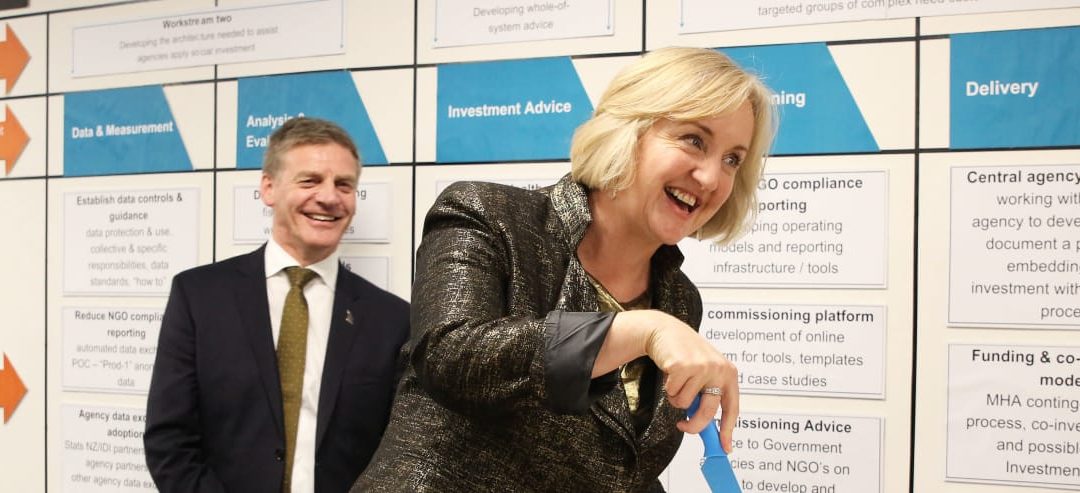By Jess Berentson-Shaw –
Self-professed policy wonk Jess Berentson-Shaw agrees with a lot of what Bill English said about welfare spending, but argues his big social investment idea failed because it was too narrow, paternalistic and complex for already-stressed people to deal with.
It’s not startling that I agree with a lot of what Bill English said. Us policy wonks share many values that are focused on creating policies that are focused doing better for the people they’re supposed to serve.
Bernard Hickey’s thoughtful analysis of Bill English’s career, highlights one area where he had great insight: an intention to do good is insufficient, government interventions must be able to prove they do good, otherwise we could well be doing harm.
“Good intentions are not enough. They’re not even a start, because there’s been a lot of money wasted and lives wrecked on the basis of good intentions expressed through public services,” English said in his last interview with Newsroom as a politician.
It is no secret that people in government can be notoriously bad at repeating the same wrong-headed thinking and action for people who need and deserve much better, and all with the best of intentions. There is a reason innovation labs, policy observatories, co-design labs, many funded by governments, are growing in popularity across the world. We want to do better in policy.
Unfortunately, the appropriate testing and reviewing of new policy experiments, as happens in other countries, remains a long way off in New Zealand. As does the ability to use innovative community-led evidence in policy development. We need much more support from people in government for risk taking and producing evidence of impact, in both “top down” (interventions by government) and “bottom up” (interventions by the community) activities.
Hickey also concludes that English “saw his role as helping those communities and pulling Government out of the way to let them get on with it. …. It was a deeply humane and thoughtful approach where Government was supposed to treat people with empathy and dignity and as individuals.”
Certainly, there is nothing to doubt that the former prime minister held compassion as a core value, after all we hold many values at the same time.
Social investment: the core values
Social investment was (prior to the change in government) a rather hard to define programme in which it was intended that data already collected by various government agencies (known as the integrated data infrastructure of IDI) would be used to assess the ‘return on social investment’ of different types of government services or interventions. In addition, data from the IDI may be used to identify the most “at risk” families and children, to inform better targeting of help into those families. At the end of the National government’s term in 2017 the aims, mission, and outcomes sought for New Zealanders by the social investment programme remained opaque.
While it may have been compassion and empathy that drove Bill English’s interest and passion even, for doing welfare in what he saw as a more innovative way with his flagship social investment programme, in reality other values drove its execution, and ultimately limited its potential to improve all our lives.
By favouring values such as individualism, small government, and even ironically, for a government that wanted less not more government in people’s lives, a paternalistic approach for those families under intense stress, the lens of social investment was narrowed to a pinpoint. A lens that failed to allow Bill English to see the conceptual issues that is key to understanding why and how children and families in resource poor settings do not always thrive and best evidence for how to change that.
It missed the “wider systems” view
What scientists now know is that stress is a huge factor in the lives of those us who do not thrive when material resources are low. It is hardly surprising, when you think about how hard it is to function optimally when we are under stress, that families experiencing multiple stressors would have no bandwidth, no spare capacity (alongside limited material and emotional resources) to thrive.
What researchers also know however, is that targeting such families with parenting education, budgeting advice, multi-disciplinary support teams, conditions and requirements delivered from above has failed to work over and over again. Ironically, such targeting simply becomes another stress experienced by families, leading to a toxic burden on children’s physical development and wellbeing – a burden they can carry into adulthood and can pass on to their children. Yet it is not inevitable, all families have the potential to thrive when policy makers widen their lens.
Absolutely, families do need empathy and fewer government agencies in their lives (this is quite different from reduced government support). They also need space from the unbearable pressures placed on them by overly complex support systems, precarious work arrangements, high effective marginal tax rates, and complicated childcare funding systems. Under an unbearable burden of stress, we are all prone to engage in less than ideal behaviours, these behaviours however should not be mistaken for the cause, but rather the effect of stress – which the system is compounding. Of course, such behaviours can become the very thing that keeps people from thriving, which is why multigenerational transfer of stress and under resourcing is such an important issue.
If we do follow “what works” for families to thrive, the high quality research shows that one of the best things that people in central government can offer is a less complex, less conditional, and more substantive income support, access to low cost, high quality housing in the right places, alongside a commitment to support communities and families to innovate and try (and measure) solutions that work best for them.
Bill English’s social investment idea, with an individualised targeting approach and what became an unbalanced focus on value for money analysis, was never going to achieve thriving communities or self-sufficient systems. “What works” in this case defined as return on investment, had become a central belief that led the programme, instead of the tool to understand how to achieve what matters.
The particular version of social investment showed no indication that it was “what works” as a government approach to wellbeing. That is a loss for us all, including Bill.
So what next for social investment?
The new government has indicated social investment the name, and the unit, is here to stay. There are pros and cons to that. Some believe that the language itself is too problematic. The term ‘investment’ is too focussed on what led to the problems in the first place – valuing best spend and economic growth over wellbeing – and words and language do matter in policy and politics. But meanings can also change. As an idea, social investment holds particular attraction for a large group of New Zealanders who do understand the language of investing in people to achieve positive outcomes, whether that be in business or in the social space.
The use of the IDI is a core component of the social investment work, and as a tool it has great potential (it may be Bill English’s real legacy). Yet we must be wary of who gets to use that data and how. There are ethical issues that have been too easily dismissed in the use of such sensitive data, especially with regard to children. Partnership with Māori especially on the use of sensitive data needs to be more than just words. If done well it is a tool that we can use to really observe and understand what government is doing and what it can do better. It can also allow risks to be taken and innovation to be trialled and tested in partnerships between people and their government. It can be a tool that can enable trust.
Social investment must become a programme that is transparent about, and committed to, delivering what matters most to the people at the centre of the policy (which in reality is all of us): if that is compassion, empathy, manaankitanga and respect for communities’ and families’, as the prime minister has indicated it to be, then I would expect to see policy and action that we know works to realise this vision for New Zealand, to follow, and that would look truly innovative.
Trials of basic incomes, removal of conditions of welfare, cost based community led co-housing, enabling innovative co-design solutions led by communities (for example the early years challenge within the Southern Initiative in Auckland), totally rethinking the crown’s relationship and approach with Māori in terms of child wellbeing (decolonising it). Much is possible when we focus on what really matters to people at the centre of policy, and if “what works” stay as a tool to determine how we best achieve what matters, not the value.
*Reproduced with permission from newsroom. Originally published 19 February 2018.
Cover photo: In happier times, then Prime Minister Bill English and then Social Investment Minister Amy Adams cut the cake to launch the Social Investment Agency last year. Photo by Lynn Grieveson.
Dr Jess Berentson-Shaw is a Research Associate of the Public Policy Institute and Co-Director of The Workshop, a research, policy and storytelling collaborative.




